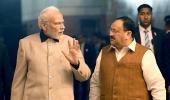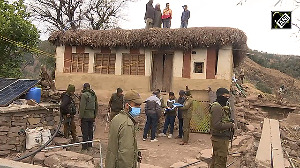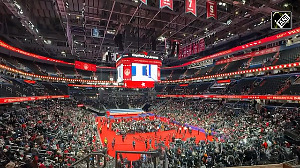The BJP is focusing on 160 seats 'we have never won, seats where we have reasonable support, and those we lost narrowly.'

When the Bharatiya Janata Party brass convenes a second review meeting to ascertain and analyse the ongoing 'Lok Sabha Pravas Yojana', it will underline the seriousness of the scheme, where 'pravas' literally means 'immigration'.
The Pravas Yojana is the fulcrum of the BJP's preparedness ahead of the 2024 parliamentary election. The party experimented with the concept before the 2019 Lok Sabha polls in just over 100 constituencies. But the model is now being applied to take the BJP close to its goal of beating the Congress's all-time high of 404 in 1984.
When the programme was discussed in May last year, the BJP listed 144 of the 543 Lok Sabha seats in the country, including the states where it peaked in 2019, turned in an unexpectedly robust showing, or virtually drew a blank.
The 144 figure was raised to 160 and, after the review session, could be scaled up to 200.
"We have increased the number of booths under the Yojana, from 75,000 to 130,000," said General Secretary Vinod Tawde, who is associated with the programme and minder for Bihar.
Asked what the criteria for selecting the constituencies were, Tawde said: "These are seats we have never won, seats where we have reasonable support, and those we lost narrowly."
In the chain of responsibilities stringing together the 'Yojana', the nodal person is a 'vistarak' (full-time volunteer), patterned after a model used in the 2022 Uttar Pradesh assembly polls. She/he will be based in the assigned constituency till 2024 and work with the BJP president of the district concerned.
However, there will be Union ministers in charge of the allotted constituencies and tasked to monitor the delivery and spread of the Centre's flagship programmes and ensure that their benefits reach the targets instead of disappearing in a bureaucratic maze.
Additionally, with the help of local BJP hands, the ministers are expected to compile demographic profiles of their constituencies using benchmarks like caste, economic status, gender, age, and upward mobility manifested in the kind of vehicles used by young people, among other metrics.
The ministers will essentially function as links between the central and state teams engaged in pre-poll prepping. Maharashtra BJP President Chandrashekhar Bawankule, who oversaw his state's election campaign, said: "In the nine years we have been in power (at the Centre), we have a labharthee (welfare) programme, which includes multiple aspects such as the Ujjwala gas scheme, food security, and housing for the poor."
"If work is stalled in places or if housing has not taken off because land has not been allotted, the ministers can find out what the problems are and work towards their resolution," Bawankule adds.
Each minister has been tasked to spend three days, including one night, in their deputed constituencies and meet the elected MP, party functionaries, local influencers, and the disadvantaged and vulnerable.
A significant prong of the Yojana is encouraging people to become receptive to social media.
Asked if the long-drawn assignment might affect ministerial responsibilities, a senior minister said: "We are here because of the people and our party. We should do much more."
BJP's Chief National Spokesperson and Rajya Sabha MP Anil Baluni said: "Every person is involved in this mammoth exercise... There's no hierarchy."
Most ministers who have been delegated constituencies did not belong to the state in which the constituencies are located, a yardstick the BJP adopted while appointing central prabhariS (minders) in states, to enable them to take an objective view of local disputes.
For instance, Nirmala Sitharaman (Tamil Nadu) has been given Baramati in Maharashtra; Bhupendra Yadav (Rajasthan) has been given Buldhana, Chandrapur, Hingoli, and Aurangabad, also in Maharashtra; Narendra Tomar (Madhya Pradesh) has been assigned Rae Bareli and Ambedkar Nagar (Uttar Pradesh); and Mansukh Mandaviya (Gujarat) has been asked to handle Sangrur, Patiala and Ludhiana (Punjab).
Evidently geography and language are not deterrents as shown by the fact that Vijay Kumar Singh (Uttar Pradesh) is in charge of Tamil Nadu's Sivaganga, Tirunelveli, Kanyakumari,and Vellore.
"The PM says 'Learn as many languages as you can'," said Baluni.
Among the marquee constituencies, Baramati and Rae Bareli rank high.
Baramati was held by Sharad Pawar, the Nationalist Congress Party patriarch.
Rae Bareli is more encouraging for the BJP because though she won, Sonia Gandhi's vote percentage there shrank in 2014 and 2019 over the previous elections.
But among the five assembly seats in Rae Bareli, in the assembly elections of 2022, the BJP got just one while the Samajwadi Party picked up the rest.
Undaunted, the BJP is determined to make a fight out of every challenge.












 © 2025
© 2025